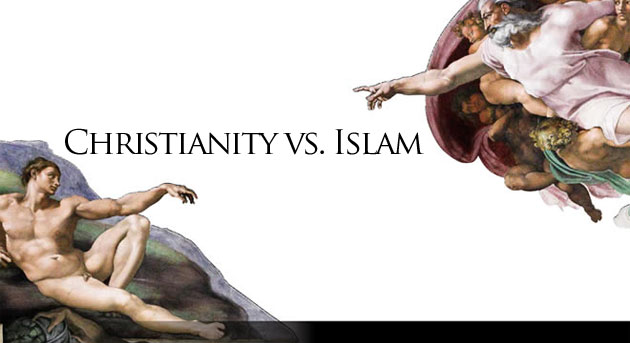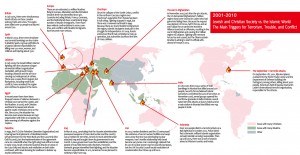Christianity vs. Islam (Part 1)
Why Is There No End to the War on Terrorism? Do the Gods Want War?
(Happy Science originally published this article in the February 2011 issue of Liberty Magazine)
It has been two years since the Arab Spring started in Tunisia in January, 2011. In May 2011, President Barack Obama described this uprising as “a historic opportunity” for the United States to “pursue the world as it should be.” Although the uprising removed several dictators from power, Tunisia’s Zine el-Abidine Ben Ali, Egypt’s Hosni Mubarak, and Libya’s Muammar al-Qaddafi, North Africa’s security is far from stable.
Last September, the U.S. ambassador to Libya died after Islamist militants attacked the consulate in Benghazi in protest of a film said to insult the Prophet Muhammad. In addition, there is Syria, where a jihadi group has become a rebel force that is fighting to topple the Assad regime. Has the Arab Spring really contributed to the stability of North Africa and the Middle East?
America’s “war on terror” might have had unintended consequences.
An Islamist militants’ attack in Algeria again shocked the world, and we came to recognize that we are still in the midst of coping with terrorism.
Unfortunately, the first decade of the 21st century has been blemished by acts of terrorism and a war to resist them. The solution to the clash between Christian and Islamic civilizations, which is the principal constituent of the hostilities, is yet to be found.
What is the necessary paradigm shift and role for Japan in order to overcome this conflict? Here we consider reconciliation between the gods by exploring their relationship, which is at the root of this conflict.
PART 1 Why Is There No End to the War on Terrorism?
Differences Between Beliefs in God Give Rise to War
As it is shown in the Algeria hostage crisis, instead of calling for an end to emotionally charged opposition and violence amongst Muslims and Westerns, people have actually been spreading it (see the above chart). The greatest conflict has been the war in Afghanistan that the US has waged since September 2001. The Americans are still continuing to fight, and the war has no end in sight.
People tend to react emotionally with “hate” towards things they do not rationally understand. The negative feelings towards Muslims in Western society have not dissipated because Westerners have not made progress in their “understanding” of the Islamic faith. A fundamental reason for the lack of compassion between the two might be due differences in the “interpretation of God” in Christianity and Islam.
In addition to presenting the historical distinctions between these two religions, this special edition also consolidates information on their ideas about god and how they relate to the current world events. A new platform to promote a common base of understanding for the Western and the Islamic world should become clear here, which could lead them to have a better partnership with each other.
2001 –
Jewish and Christian Society vs. the Islamic World
The Main Triggers for Terrorism, Trouble, and Conflict
- The September 11 terrorist attacks
On September 11th, 2001, hijacked planes crashed into the World Trade Center and the Department of Defense building (the Pentagon), among others, killing about 3000 people. Americans held Al Qaeda, Osama bin Laden’s international terrorist organization, responsible for the attacks.
- The war in Afghanistan
In November 2001, just after the 9/11 attacks, the US demanded Afghanistan’s Taliban regime hand over Osama bin Laden who had gone into hiding there. Because the request was denied, US forces, NATO forces, and an anti-Taliban force named the Northern Alliance launched an offensive, resulting in the war in Afghanistan and causing the Taliban regime to collapse. Fighting with remnant forces has not ceased, but the Obama administration is aiming to start its official withdrawal of troops in 2013.
- India
In July 2006, there was a series of train bombings in Mumbai that killed around 200 people. Security forces believed Islamic extremists committed the acts of terrorism. In November 2008, armed groups opened fire and threw grenades in indiscriminate coordinated terrorist attacks at luxury hotels and at a train station in Mumbai that killed over 195 people in total.
- Indonesia
Over 200 people died in a terrorist attack on a Bali nightclub in October 2002. Police identified a domestic militant Islamist organization Jemaah Islamiah as being responsible. Then up until 2005, there was a rash of attacks aimed at Western tourists and hotels.
- Chechnya
Since the collapse of the Soviet Union, conflict in the northern Caucasus region over Chechnya’s separation from Russia has been in full swing. Fighting stopped in 1996, but there was a renewed outbreak in 1999. Because there are many Muslim immigrants in the region, Islamist insurgents took part in the struggle for independence. In 2009, Russia announced that it had completed a mop-up operation, but authorities sacrificed the lives of many civilians.
- Europe
There are an estimated 20 million Muslims living in Europe. Alienation and discrimination towards them has intensified since 9/11. Countries including Britain, France, Germany, and the Netherlands have a particularly large number of Muslim immigrants. There have been violent confrontations in some countries, and conflicts with Muslim immigrants have become more serious.
- Britain
In July 2005, there were simultaneous bomb attacks on three London subway trains and a bus. The explosions killed over 50 people and injured around 700.
- Spain
In March 2004, there were simultaneous terrorist bombings on four trains in Madrid, Spain. A group with links to al Qaeda claimed responsibility for killing over 200 men, women, and children and injuring about 1500.
- Lebanon
In July 2006, the Israeli military started fighting with the Lebanese nongovernmental militant organization Hezbollah, with ground troops invading Lebanon and the air force carrying out widespread air strikes. There was a cease-fire in August, but flashpoints, including small-scale conflicts, have remained the region and continue to appear in the news.
- Egypt
In recent years there have been frequent waves of violence between a Christian sect named the Coptics and the Muslims. In 2008, anti-Christian sentiment increased and attacks against Coptic Christians were on the rise. Since 2010, the situation has become even worse because an Iraqi organization with links to al Qaeda has been warning of offensives against the Coptics.
- Palestine
In 1993, the PLO (the Palestine Liberation Organization) and Israel agreed to implement a Palestinian interim self-government for the West Bank and the Gaza Strip (the Oslo Accords), but the implementation of the agreement came to a standstill when the right wing took office in Israel. In early 2009, Israel conducted surprise attacks on areas of the Gaza Strip and attacks and retaliation on both sides continued, with Israel showing its readiness to bolster up Jewish settlements.
- Iraq
In March 2003, concluding that the Hussein administration possessed weapons of mass destruction and the country was a hotbed for terrorists, America’s Bush administration attacked Iraq and brought down its government in one month. A new government was then established, and the people of Iraq held democratic elections. However, domestic groups intensified their fighting, and the situation became unpredictable. In 2011, American forces planned to withdraw fully from Iraq.
- Iran
In 2002, Iranian dissidents and the US announced the existence of secret nuclear facilities and suspicions arose that Iran was developing nuclear weapons. Iran’s hostile relationship with Israel became very tense. Iran convincingly claimed that its use of nuclear power was for peaceful purposes, but the UN Security Council issued resolutions of condemnation four times up until 2010.




















